Trilogy with its partner Playspan recently launched the Firefly platform as a new way to create MMO titles. Dynamic, this platform was created by veterans of the console gaming industry and is a sign of the shifting winds in the games business. We spoke with Eric Hartness, marketing head for Playspan and Michael Pole, Trilogy Studios CEO, about Firefly.
[a]list: Tell me generally about the agreement you’ve signed with each other.
Eric: We’re providing the monetization component for Firefly as a service for people that want to sell virtual currency or digital goods. It provides a great opportunity for us because they provide a model of development where we can deliver our service instantly to developers.
Mike: We examined other options, like Live Gamer, but the most scalability was through Playspan. For us, every client has a different set of requirements; a number of our other clients are looking at microtransactions, a few for subscription, and when we looked at the technology from Playspan, it was a perfect match.
[a]list: Do you think the UltimatePay services will make Firefly an “easier sell” to developers?
Mike: We are not looking to license the the Firefly platform to third parties. Right now, it’s just for the games we’re developing for other clients. What Firefly does is it allows us to make changes to how we monetize the game world. If we generate a subscription model MMO, eventually we can switch in micropayments and a free model. Due to the rabid consumption of online gamers, it’s important to have this as part of our portfolio. Dungeons and Dragons Online was a great example of a game with a similar sort of turnaround from free-to play to subscription.
[a]list: Who are you targeting with Firefly?
Mike: We’re working in the traditional base. I’ve worked with one of the leaders of titles like Medal of Honor and Simpsons: Road Rage. We’re a 40 person group, with 15 people at HSI. Right now, our portfolio is a fine balance between our own titles and new market games. We’re looking at top 100 companies, whether we’re talking about Facebook games, iPad games or online games. So it’s good to have a balanced portfolio.
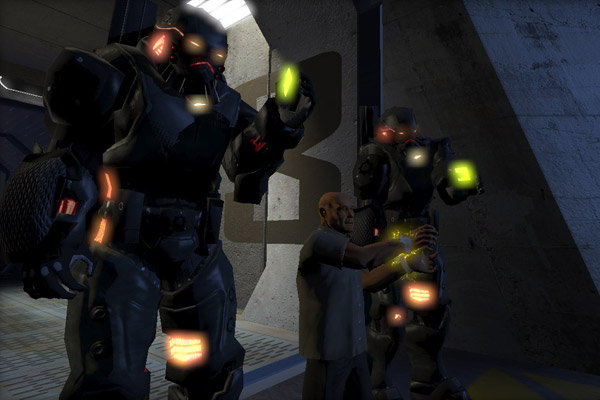 Daybreakers, an example of content from Trilogy.
Daybreakers, an example of content from Trilogy.
[a]list: What about social networking?
Mike: We’re in the process of launching a product on Facebook, but it’s not too dissimilar from what Zynga’s doing. We’re really big fans of NewToy and what they have done on a number of Facebook integrations. We’re looking to have everything you could expect from the product.
[a]list: Will there be a Firefly gaming portal?
Mike: We have some ideas of where the games will reside. Some will want to be integrated, but it depends on what the product calls for.
[a]list: Provide me some details of the analytics console, consolidated reporting, and monthly settlement that you will provide developers.
Eric: From the monetization standpoint, one of our features is our developer console. It’s a proprietary system that enables a game business manager to look at very high level revenue trends and detailed occurances. They can check out revenue relative to geography, items, cost over time – and they can take this data and download it to Excel, so it’s a robust console for data.
Mike: It depends on what the target demographic is. What’s important in the casual MMO market is knowing where these kids are spending their time and in the play experience. You can see what items in the world they’re buying and what they’re not.
The analogy I like to use for the traditional games business is the movie business. You spend years on a release and put it on a disc and then cross your fingers. The business we occupy now, it’s much more akin to the TV business. We can launch a product, and then with a game that’s launched online it’s all about your listening skills and crafting the experience users have. You launch the initial TV pilot and it’s received however, and you tune your experience to your main watchers, or in our case, players. You deal with the information. That’s the most important part: you don’t ship these things and forget, you build a sustainable audience.
What I love about Playspan is that it’s scalable. For a smaller company like ourselves, it gives us money for the products. Could you develop this technology internally Yes, for millions of dollars and years of experience. They’ve already got the experience.
[a]list: A lot of larger companies will try launching initiatives on their own internally, and no one will have any enthusiasm for it and it won’t go well.
Mike: There are companies that aren’t as inwardly focused as others. The great part of EA, which has had its challenges, is that they are comfortable sitting on the sidelines and watch things grow, and look at who they want to bring on. They buy marketability and market space. In an industry where ideas are produced in such a short period of time, it’s important to look at start ups, and a lot of larger companies are standing pat. EA, though, was the best place in the industry to work with at the time. They encouraged creativity so much.
[a]list: Describe to me the sort of sponsorships you can provide to developers for their MMO.
Mike: We look at this as multiple rivers of revenue. You have subscription model with a monthly fee, a microtransaction model with buying virtual items and money and there are the sponsorship models, which instead of other payment options, the content partner will pay for it via a a sponsorship upfront. You can click a button and sit through an ad and play the rest of the day for free. In this product, there are no microtransactions.
We’re leaning towards the free-to-play model, and I feel our experience teams are good at stickiness, and use purely virtual goods to monetize. There are content partners that don’t look at it that way, and PlaySpan clients that may look at it differently. We’re building for gamers that are more casual, looking for entertainment in short increments that are still as satisfying. Maybe it isn’t what a hardcore person is looking for, but for the mass market it’s perfect.
[a]list: It’s hard to compete in the hardcore MMORPG subscription realm with World of Warcraft – people forget that they’ve been making and polishing content for the game for several years!
Mike: It’s not just the seven years that World of Warcraft had been around since it launched. It started with Warcraft and the expansion, and Warcraft 2 and the expansion, and Warcraft 3 and the expansion, building up the IP. We had VCs run in and say, “How do we do that success?” And I was like, “Why would you want to do that?”
Some of these people think “Oh no, I have to get something from retail!” and they crap it out for sales. There’s this one company we talked to that’s worried that they won’t be able to get subscription fees, so we told them you might as well give away and get paid other ways. I think if you have a robust experience, it’s easier to sell $50 worth of content rather than a subscription.”
The median spend for our players is higher. VIPs spend more because they can get more content! They’re not limited to only $50 content or a subscription’s worth of content. For ngmoco’s WeRule, the best way to progress is buy Mojo to build and harvest quicker. And I found myself spending two $40 packets. I’m a gamer, and this is a wonderfully addictive game. And these are the sort of things that are going to win; with Zynga, while it’s refined, there’s not much there.
[a]list: So you’re not sold on Zynga’s model?
Mike: A lot of these Facebook games are just not that ambitious. Zynga is just making the same game over again; Frontierville was done in four months! We believe in something that is casual but is more compelling.
[a]list: Gentlemen, thank you both.
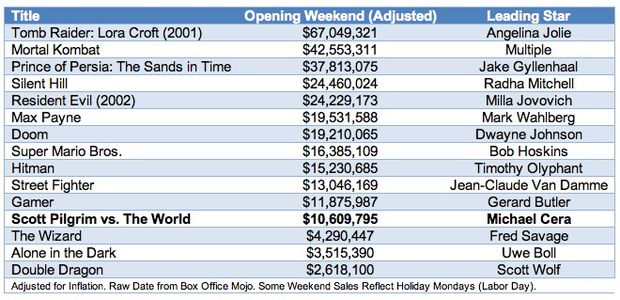
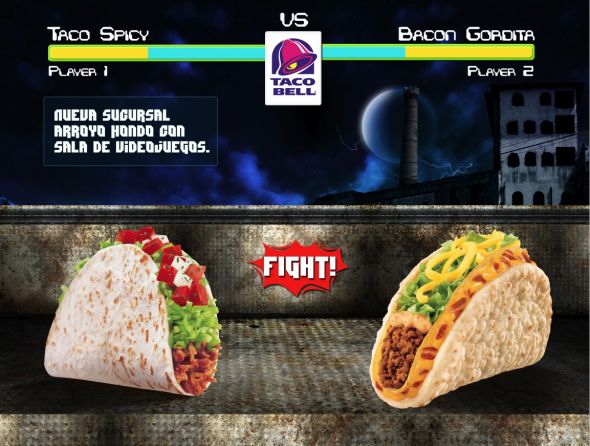 Taco Spicy vs. Bacon Gordita
Taco Spicy vs. Bacon Gordita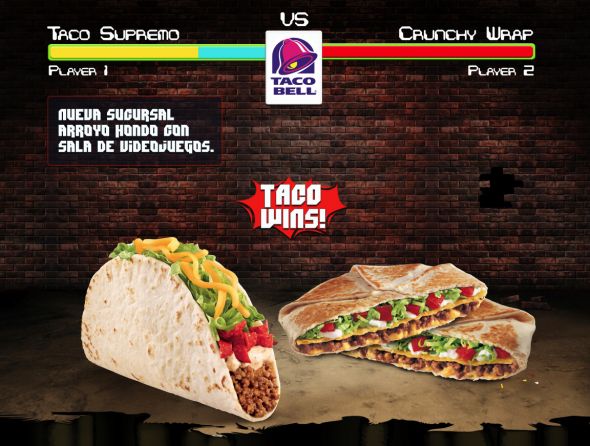 Taco Supremo vs. Crunchy Wrap
Taco Supremo vs. Crunchy Wrap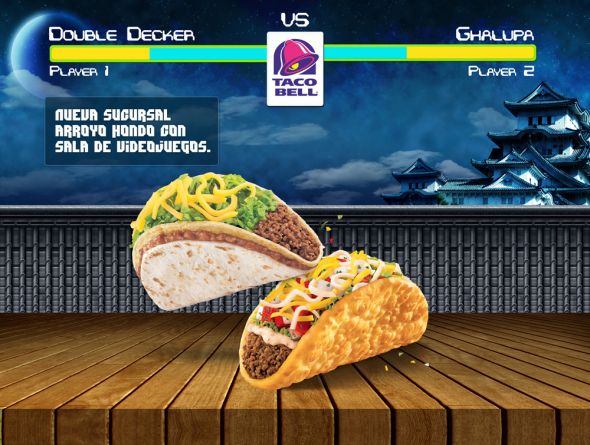 Double Decker vs. Ghalupa
Double Decker vs. Ghalupa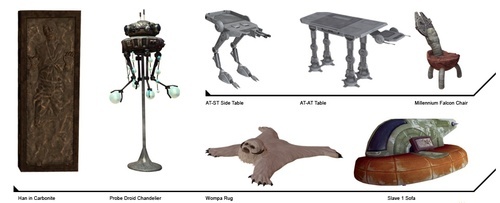
 Daybreakers, an example of content from Trilogy.
Daybreakers, an example of content from Trilogy.